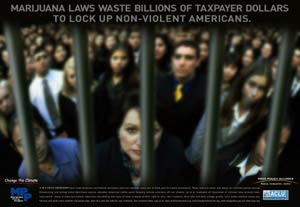A couple of months ago, I discussed the idiotic and constitutionally challenged Oklahoma Representative Ernest Istook who didn’t like the fact that Change the Climate was running ads on the Metro calling for the legalization of marijuana. So he pushed for a last-minute provision on the omnibus spending bill that would prevent any transit system from accepting ads that promoted changing the laws regarding marijuana. And it passed. And was signed into law.
Now this is so completely and absolutely a violation of the constitution that it’s almost funny, yet it became law.
Fortunately, we have a number of active Drug Policy Reform organizations and none of them are taking this lightly. The day the law went into effect, four of these organizations attempted to purchase space for this ad in the DC transit system:

One in three adult Americans have tried marijuana and federal marijuana laws can imprison every one of them just for simple possession. These laws are unfair and abuse our criminal justice system. Prosecuting and jailing these Americans wastes valuable resources better spent keeping violent criminals off our streets. As it is, hundreds of thousands of citizens have already been imprisoned – many of them non-violent, otherwise law-abiding and many of them stripped of their right to vote, their property, their jobs and their college grants. Let’s adopt common sense and fairness and enact more realistic marijuana laws. And let’s save the jails for real criminals. Get involved today.
As expected, the ad was rejected due to the new provision from Congress.
So today, the following distinguished organizations jointly announced a lawsuit against the federal government and the DC transit system (the links go to the organizations’ pages about the lawsuit):
The suit is called ACLU v. Mineta. Remember that name — I guarantee you’ll be hearing a unanimous verdict and it won’t be in favor of the feds. This is a no-brainer.
In fact, reading the Memorandum of Plaintiffs in Support of Their Motion for Preliminary Injunction (pdf), you can almost detect undercurrents of glee in the coalition’s case:
The material facts are not in dispute and the constitutional infirmities raised by Section 177 are neither complex nor subtle. Section 177 is unconstitutional, both on its face and as enforced by WMATA, a state actor.
The attorneys for the coalition are going to have fun with this one. (Remember though that lawsuits aren’t cheap — consider donating to one or more of the organizations.)
Violation of Oath
I have often felt that Congress has gotten off without any sanctions despite violating their oath to uphold the Constitution of the United States. Particularly when you consider that the First Amendment states:
Congress shall make no law respecting an establishment of religion, or prohibiting the free exercise thereof; or abridging the freedom of speech, or of the press; or the right of the people peaceably to assemble, and to petition the government for a redress of grievances.
It doesn’t say: “Congress shall make unconstitutional laws in order to make a political statement and then let the courts straighten it out.”
Now this unfortunately happens all the time, but rarely has there been a case this blatant. Just in case there was any doubt in your mind that these Congressmen actually intended the provision to silence the free speech rights of citizens, check out the statement that they arrogantly printed in the conferees report:
The conferees note with displeasure that public service advertising space in Washington, DC’s Metropolitan Area Transit Authority rail stations and buses has been used to advocate changing the nation’s laws regarding marijuana usage. WMATA has provided $46,250 worth of space to these types of ads; therefore, as a warning to other transit agencies, the conferees have deleted funding totaling $92,500 from projects and activities for WMATA in this bill……the conferees remain concerned that the opportunity exists nationwide for transit properties to run similar advertising. Therefore the confererence agreement includes a provision (Section 177) that prohibits Federal transit grantees from obligating or expending funds that would otherwise be available in the Act, if the grantee is involved directly or indirectly with any activity, including displaying or permitting to be displayed advertisements on its land, equipment, or in its facilities, that promote the legalization or medical use of substances listed in schedule 1 of section 202 of the Controlled Substance Act.
Istook, and the other conferees involved, should be impeached and removed from office.

